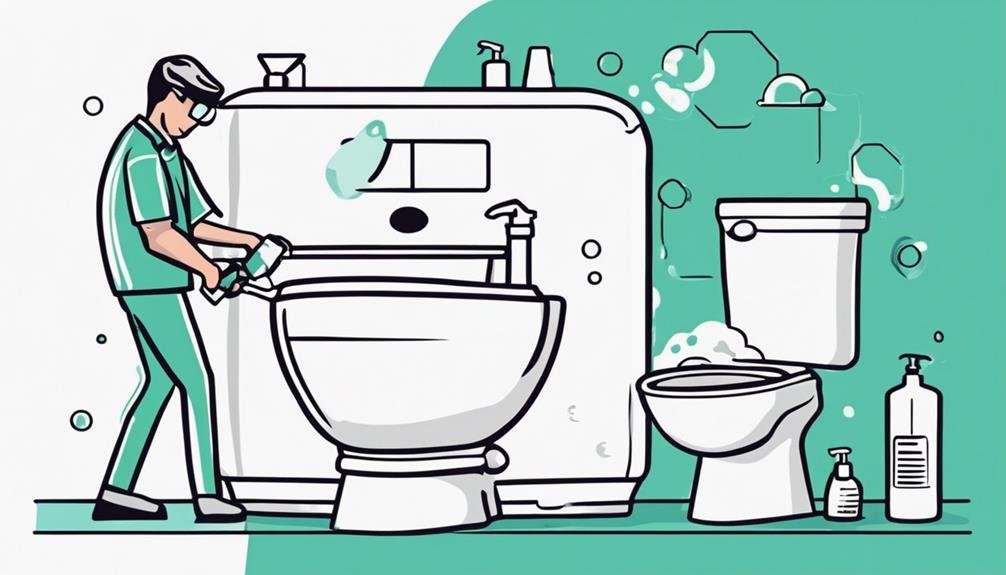To tackle septic tank troubles with tranquility, follow these top 5 DIY care tips for optimal maintenance. Regular pumping is paramount to prevent backups and blockages, but what about proper waste disposal and septic-safe products?
Stay tuned to discover how monitoring water usage and maintaining the drainfield can save you from costly repairs down the line.
Key Takeaways
- Adhere to a regular pumping schedule every 3-5 years to prevent issues and extend tank lifespan.
- Use eco-friendly products and avoid harsh chemicals to maintain a healthy bacteria balance in the tank.
- Monitor water usage, fix leaks promptly, and install low-flow fixtures to conserve water and prolong system life.
- Protect the drainfield by avoiding planting near it, refraining from heavy machinery, and promoting grass growth for proper absorption.
Regular Pumping Schedule

To maintain optimal septic tank function, ensure you adhere to a regular pumping schedule. The pumping frequency of your septic tank is crucial for its proper operation. Experts recommend pumping your tank every 3 to 5 years, depending on household size and water usage. By sticking to this schedule, you can prevent solids from building up and causing blockages or backups in your system. Regular pumping also extends the lifespan of your septic tank, saving you money on costly repairs or replacements in the long run.
In addition to pumping, regular tank inspection is essential to catch any signs of trouble early on. Keep an eye out for slow draining sinks or toilets, gurgling sounds in the plumbing, or unpleasant odors around the septic tank area. These could be indicators of a full or failing septic system. Addressing these issues promptly can prevent major malfunctions and ensure your septic tank continues to operate efficiently. By taking these proactive steps, you can enjoy the benefits of a well-maintained septic system for years to come.
Proper Waste Disposal Techniques
Proper waste disposal techniques play a crucial role in maintaining the functionality and longevity of your septic tank. To ensure your septic system operates efficiently, consider eco-friendly alternatives and chemical-free solutions when disposing of household waste. Avoid pouring harsh chemicals, grease, oil, or non-biodegradable items down the drain. Opt for biodegradable soaps and cleaners to minimize the impact on your septic tank's natural processes.
Implementing proper waste disposal habits not only benefits your septic system but also the environment. By choosing eco-friendly alternatives, you reduce the risk of harmful chemicals leaching into the soil and groundwater. Additionally, chemical-free solutions help maintain a healthy balance of bacteria within the septic tank, aiding in the breakdown of waste.
Use Septic-Safe Products

Consider choosing septic-safe products to maintain the health and efficiency of your septic tank. Using eco-friendly alternatives, such as homemade remedies and safe cleaners, can help prevent harmful chemicals from disrupting the natural balance of your septic system. Chemical treatments and harsh cleaners can kill off the beneficial bacteria in your tank that are essential for breaking down waste effectively. By opting for septic-safe products, you ensure that your tank continues to operate smoothly without any unnecessary interference.
Homemade remedies like vinegar, baking soda, and lemon juice are excellent alternatives to commercial cleaning products. These natural ingredients are gentle on your septic system and can help keep your tank clean without causing any harm. Safe cleaners labeled as septic-friendly are also available in stores and online, offering convenience without compromising on effectiveness.
Making the switch to septic-safe products is a simple yet impactful way to care for your septic tank and promote its longevity. By being mindful of the products you use, you contribute to a healthier and more sustainable septic system.
Monitor Water Usage
When managing your septic system, being mindful of your water usage is crucial to maintaining its optimal performance and longevity. Conserving water not only benefits the environment but also helps your septic system function efficiently. Excessive water usage can overwhelm the system, leading to potential leaks and backups.
To prevent issues, regularly monitor your water consumption and promptly repair any leaks in faucets, toilets, or pipes. Leak detection is essential as even minor leaks can result in a significant waste of water and put extra strain on your septic tank.
Implementing water conservation practices such as fixing leaks, installing low-flow fixtures, and spreading out laundry and dishwasher loads can significantly reduce water usage in your household. By being proactive in monitoring and managing your water usage, you can prolong the life of your septic system and avoid costly repairs in the future.
Maintain Drainfield Health

Maintaining the health of your drainfield is essential for ensuring the proper functioning of your septic system and preventing costly repairs in the future. To keep your drainfield in good shape, there are some preventative measures you can take.
Firstly, avoid planting trees or shrubs near the drainfield area to prevent roots from infiltrating the system. Additionally, refrain from driving heavy machinery or parking vehicles on top of the drainfield as this can compact the soil and disrupt its ability to treat wastewater effectively.
Landscaping solutions can also contribute to maintaining your drainfield's health. Consider planting grass over the drainfield as it helps in absorbing excess moisture and prevents soil erosion. Regularly mow the grass to a suitable height to ensure proper aeration and avoid the growth of deep-rooted plants that could harm the system.
Frequently Asked Questions
How Can I Tell if My Septic Tank Needs to Be Pumped Before the Recommended Schedule?
If you notice slow drains, gurgling pipes, or sewage backups, it's likely time to pump your septic tank sooner. Keep an eye on water usage and odor detection to catch issues early and prevent costly repairs.
Are There Any DIY Methods for Checking the Health of My Septic Tank Between Professional Inspections?
To maintain your septic system health between pro checks, try DIY maintenance. Check septic tank condition by monitoring water drainage, lush grass near the tank, and odors. These simple tasks help catch issues early.
What Are Some Common Mistakes People Make When Disposing of Waste That Can Harm Their Septic System?
To keep your septic system healthy, avoid flushing non-biodegradable items, chemicals, grease, and excessive water down the drains. Proper waste disposal is key to septic system maintenance. By being mindful, you can prevent costly repairs.
How Do I Know if a Product Is Safe to Use With a Septic Tank?
To ensure a product is safe for your septic tank, always check for labels that indicate "septic system safe." For instance, a detergent claiming biodegradable and phosphate-free properties can be an excellent choice for your system's health and longevity.
What Are Some Signs That My Drainfield May Be Experiencing Issues That Need to Be Addressed?
If you notice soggy areas, foul odors, or slow draining fixtures, your drainfield may be in trouble. Regular maintenance and prompt troubleshooting can prevent costly repairs. Stay vigilant to signs of drainfield distress for a smoothly functioning septic system.
Conclusion
In conclusion, taking care of your septic tank doesn't have to be a daunting task. By following these top 5 DIY tips, you can ensure that your septic system stays in good working condition.
Remember, regular pumping, proper waste disposal, using septic-safe products, monitoring water usage, and maintaining the health of your drainfield are key to avoiding costly repairs down the road.
With a little effort and attention to detail, you can keep your septic tank running smoothly for years to come.

